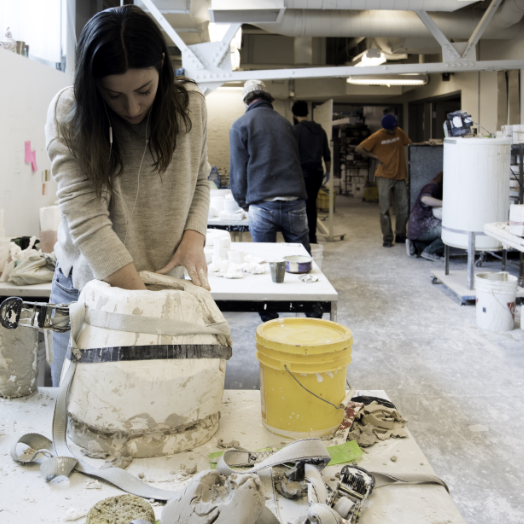BFA, Ceramics
The Bachelor of Fine Arts, Major in Ceramics offers students an opportunity to explore the media and practices of ceramics. It is designed to give you an understanding of vessel, sculptural and architectural ceramics. As you explore these elements you will examine the relationships between design, materials, colour, process and techniques. An awareness of historical and contemporary issues in ceramics and their relationship with other discourses (such as fine art, design, and architecture) will help to develop an informed perspective on your work.
Division: Craft/Foundation
Degree: Bachelor of Fine Arts
Program: Major in Ceramics
Program Length: 4 years (see Degree Requirements)
Campus: Port Campus
Admission Deadline: March 1 for September; October 1 for January

NSCAD ceramics graduates have established successful international studio practices that contribute to the profile of Canadian ceramics. Our graduates are writers, critics, curators, arts administrators in galleries and museums, and designers for industry. Many go on to study in prestigious graduate programs and teach in colleges/universities across North America.
What Our Ceramics Students Can Expect
– The ceramics program has one of the best facilities in North America. Located in the beautiful Port Campus, students have access to five high-efficiency custom Blaauw kilns, an assortment of potters’ wheels from various manufacturers, ConeArt electric kilns with Bartlett computer controls, a 54-ton Ram press with various steel dye frames, a fully equipped glaze kitchen and lab, and much more.
– A faculty of accomplished artists, scholars, educators and leaders in their craft.
– Graduating Interdisciplinary Design students put on an end-of-year exhibition to launch their work and publish a corresponding catalogue.
Featured Courses
Introductory Ceramics
Introductory Ceramics: This course is designed to give students a broad intensive introduction in which students encounter figurative ceramics, pottery and sculpture by a variety of means, but concentrating on hand construction and ceramic sculpture outcomes. This course provides an introduction to the technologies of earthenware clay, glazes, and electric kiln firing and the fundamentals of good studio practices and safety.
Intermediate Handbuilding
Intermediate Handbuilding: This course develops from Introductory Ceramics and for students with demonstrated prior experience in ceramics to work on intensive building techniques for ceramic sculpture. The course will develop skills in modelling, translating, scaling and large-scale construction. Experimental construction techniques and strategies will expose students to an overview of methods of contemporary ceramic sculpture. An emphasis on large-scale construction. Students work in small teams to organize and fire electric kilns as well as more complex experiments in surface development for earthenware.
Adv. Wksp: Figurative Ceramics
Adv. Wksp: Figurative Ceramics: This course explores representations of the human body in clay/ceramics while considering the figure in contemporary art and in historical precedents. The course transitions from observation and interpretation from life models and evolves to personal interpretations and questions of the body in a contemporary context. A variety of fabricating methods, scales, surfaces and firing will support the projects that range from figurine to life scale. Readings and discussions will assist in understanding the state of figurative practice today, and the emphasis on ‘body’ as both subject and object.
Adv. Wksp: Art of the Table
This course uses the table as an environment for considering the use-value of ceramics in defining social spaces. The emphasis of the course will explore contemporary and historical approaches to function as it relates to food, society and ceramics. What and how we eat is never static and this course will dissect social interaction through objects in the space of the table. The organization and display of objects offer the opportunity to work with the relationships of ceramic objects to each other with a direct emphasis on creating and defining social spaces. The course will develop critical approaches to how ceramics shapes our relations using historical form in an effort to reconsider the way we interact. Examples from contemporary design and craft will inform processes in moldmaking, handbuilding and throwing as primary construction techniques.
Please visit the Academic Calendar for a description of all courses available during your undergraduate studies.







